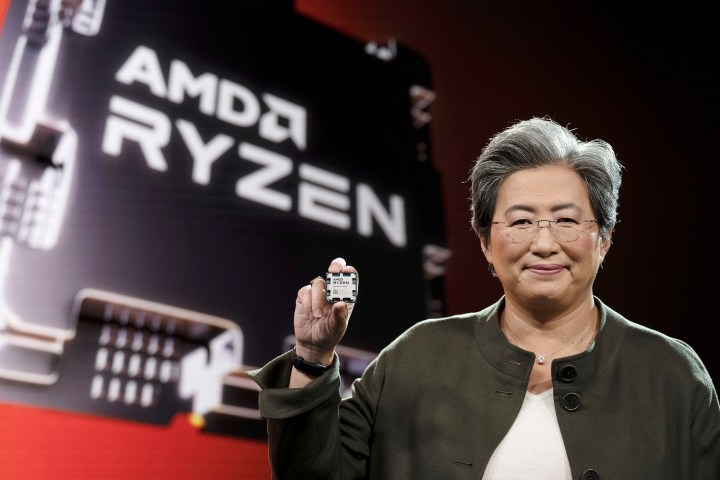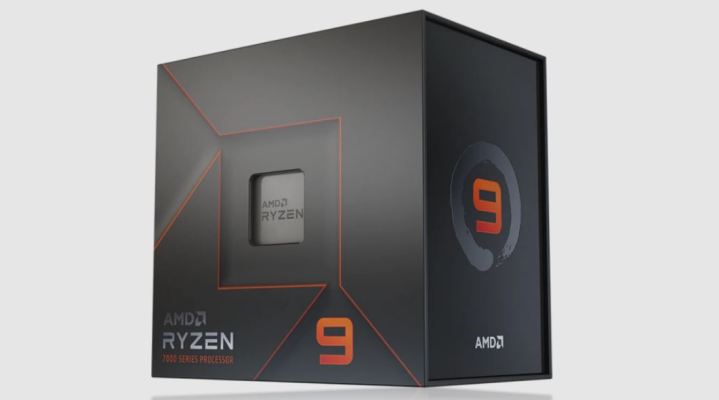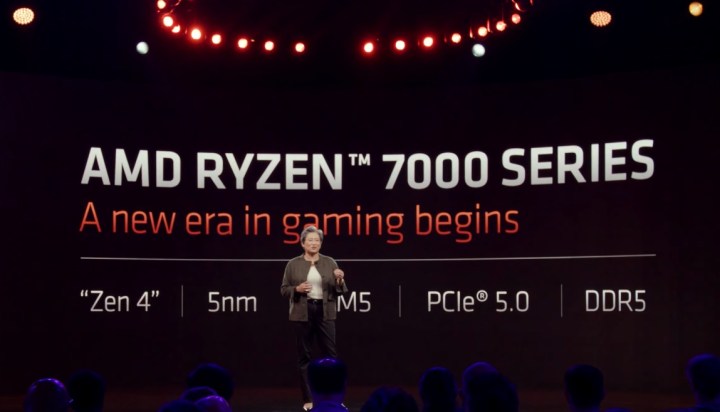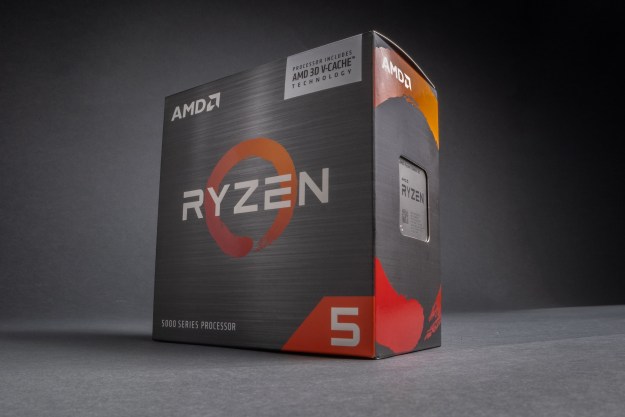AMD has unveiled the next-generation Ryzen 7000 processors, and amongst them are the two flagships: the Ryzen 9 7950X and the Ryzen 9 7900X. These enthusiast-grade processors are said to deliver intense levels of performance, but they both differ from one another in a number of ways.
Is the Ryzen 9 7950X worth the extra money? Does it bring a massive upgrade over the 7900X? We’ll explore the ins and outs of these two processors to judge which one is the better pick if you’re shopping for a new AMD CPU.

Specs
| AMD Ryzen 9 7950X | AMD Ryzen 9 7900X | |
| Cores | 16 | 12 |
| Threads | 32 | 24 |
| Base clock | 4.5GHz | 4.7GHz |
| Boost clock | 5.7GHz | 5.6GHz |
| Combined cache | 80MB | 76MB |
| TDP | 170W | 170W |
| Integrated graphics | AMD Radeon | AMD Radeon |
Instead of maintaining a tight-lipped approach, AMD is quite generous when it comes to sharing information about the new processors. Thanks to that, we have a good set of specifications to look into.
While AMD bumped up the specs of the new processors in many ways, their core configurations remain unchanged from their Zen 3 counterparts. However, at 16 and 12 cores respectively, both the Ryzen 9 7950X and the 7900X should offer good performance all across the board.
When it comes to clock speeds, we have a small surprise — the Ryzen 9 7950X brings a higher boost clock speed (5.7GHz versus 5.6GHz) but a lower base clock speed with 4.5GHz compared to the 4.7GHz delivered by the 7900X.
In terms of combined cache, the two processors are once again quite similar, with 80MB for the 7950X and 76MB for the 7900X. The TDP is exactly the same, sitting at 170 watts for both processors. They both also offer integrated AMD Radeon graphics, a first for AMD flagship CPUs, with two graphics cores and a frequency of 2,200MHz.
Pricing and availability

AMD has set the same release date for both the Ryzen 9 7950X and the Ryzen 9 7900X. First announced on August 29, the processors will arrive on September 27, accompanied by two other, less-expensive CPUs: the Ryzen 7 7700X and the Ryzen 5 7600X. The rest of the lineup will follow at a later date. AMD has also confirmed that it will, eventually, release 3D V-Cache versions of their best processors, so it’s not impossible that we might see the 7950X or the 7900X make a comeback in a X3D version in the future.
The Ryzen 9 7950X will cost $700, while the Ryzen 9 7900X is $150 cheaper and comes priced at $550.
Performance

The official benchmarks for the Ryzen 9 7950X and the Ryzen 9 7900X are not quite here yet — we’ll have to wait until the reviewers get their hands on the CPUs and share their findings. For the time being, we have to rely solely on AMD’s own figures, and though they should be viewed with a skeptical eye, they look very, very promising.
According to AMD, the flagship Ryzen 9 7950X will be the best option for gamers and creators alike, but in all honesty, both of these CPUs will likely excel in such tasks — the 7950X will just be a little better. To prove the capabilities of the 7950X, AMD compared it to its Zen 3 counterpart, the Ryzen 9 5950X.
The new 5nm process technology used by AMD in the making of Zen 4 serves up upgrades across the board, with a 13% higher instruction per clock count versus Zen 3 processors. In gaming, the new Zen 4 part proved to be up to 35% faster, while in content creation, it managed to win by as much as 48%. In a content-creation demo, when pitted against Intel’s Alder Lake flagship Core i9-12900K, the AMD processor proved to be up to 57% faster than Intel. It was also 57% faster in raytraced rendering performance.
The Ryzen 9 7950X was also tested against its counterpart at various levels of TDP. At 65 watts, it delivered 74% better performance; at 105 watts it outperformed the Zen 3 CPU by 37%; and lastly, at 170 watts, it still managed to beat its older sibling by 35%.
AMD also proved to be superior in performance per watt, which is a factor that it’s heavily targeting in this generation of processors. The Ryzen 9 7950X promises to deliver up to 47% better performance per watt than the Core i9-12900K. The former has a seemingly strict TDP of 170 watts, while Intel has a base TDP of 125 watts that can be brought up to 241 watts in turbo mode.
AMD’s quest for efficiency was shown in two ways. As a whole, Zen 4 processors are said to consume up to 62% less power than Zen 3 while maintaining the same performance. Conversely, when the power consumption is the same, the Zen 4 parts are up to 49% faster.
It’s a tough call

AMD has made this a particularly difficult decision. Comparing the Ryzen 9 7950X to the Ryzen 9 7900X does reveal some differences, but they are not major enough to tilt the scale entirely in one direction.
When it comes to the Ryzen 9 7950X, we have it all — a higher boost clock, more cores and threads, and a larger combined cache — and we have performance figures delivered by AMD itself. The Ryzen 9 7900X is currently more of an enigma — AMD hasn’t shared performance metrics for that processor in particular. Fortunately, it won’t be long before both of these CPUs will be thoroughly tested upon their release.
On the other hand, the Ryzen 9 7900X is not far behind the better part. It has a higher base clock, a fairly similar number of cores, and the cache is still huge. Both of the CPUs have the exact same TDP, so that’s not a consideration at all.
There is little doubt that the Ryzen 9 7950X and the Ryzen 9 7900X will both excel in gaming and creative workflows alike. The extra four cores might prove to be important if you’re dealing with a lot of resource-heavy tasks, but for many regular users, the difference won’t be a game changer.
Is the Ryzen 9 7950X worth the extra $150? It very well might be, but the gains are not going to be a deal-breaker one way or the other. Get the best of the best if you feel that you need to, but otherwise, you’re better off putting that $150 toward the DDR5 RAM that AMD’s new AM5 socket requires.
Editors' Recommendations
- AMD’s new Ryzen 9000 is slower than its fastest previous-gen chips
- AMD is giving up on Windows 10
- AMD may have a leg up on Intel with Zen 5
- I compared all of AMD’s V-cache CPUs to see which you should buy
- The iPhone 15’s chip challenges Intel’s fastest desktop CPU — but there’s a catch



